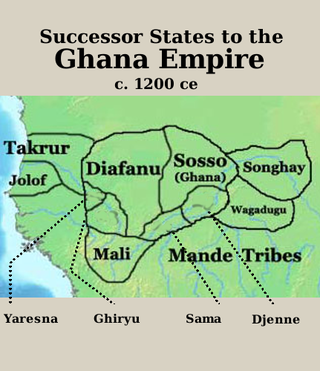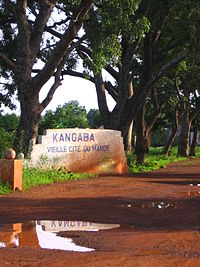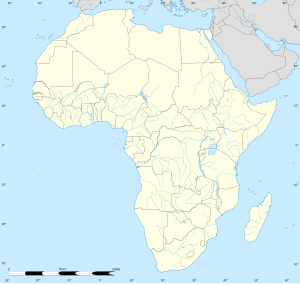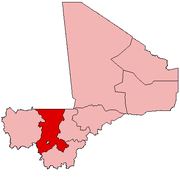
The Mali Empire was an empire in West Africa from c. 1226 to 1670. The empire was founded by Sundiata Keita and became renowned for the wealth of its rulers, especially Mansa Musa. At its peak, Mali was the largest empire in West Africa, widely influencing the culture of the region through the spread of its language, laws and customs.

The Mandinka or Malinke are a West African ethnic group primarily found in southern Mali, the Gambia and eastern Guinea. Numbering about 11 million, they are the largest subgroup of the Mandé peoples and one of the largest ethnic-linguistic groups in Africa. They speak the Manding languages in the Mande language family and a lingua franca in much of West Africa. The majority of Mandinka adhere to Islam. They are predominantly subsistence farmers and live in rural villages. Their largest urban center is Bamako, the capital of Mali.
Sundiata Keita was a prince and founder of the Mali Empire. He was also the great-uncle of the Malian ruler Mansa Musa, the wealthiest person of all time.
Naré Maghann Konaté was a 12th-century faama (king) of the Mandinka people, in what is today Mali. He was the father of Sundiata Keita, founder of the Mali Empire, and a character in the oral tradition of the Epic of Sundiata.

Mansa is a Maninka and Mandinka word for a hereditary ruler, commonly translated as "king". It is particularly known as the title of the rulers of the Mali Empire, such as Mansa Musa, and in this context is sometimes translated as "emperor". It is also a title held by traditional village rulers, and in this context is translated as "chief".

Soumaoro Kanté was a 13th-century king of the Sosso people. Seizing Koumbi Saleh, the capital of the recently defunct Ghana Empire, Soumaoro Kanté proceeded to conquer several neighboring states, including the Mandinka people in what is now Mali. However, the Mandinka prince Sundiata Keita built a coalition of smaller kingdoms to oppose him at the Battle of Kirina, defeating the Sosso and leaving Sundiata's new Mali Empire dominant in the region.
Sunjata is an epic poem of the Malinke people that tells the story of the hero Sundiata Keita, the founder of the Mali Empire. The epic is an instance of oral tradition, going back to the 13th century and narrated by generations of griot poets or jeliw (djeli). There is no single or authoritative version. Material pertaining to the epic first began to be collected during the early 20th century in French Sudan, notably by the French elite school École William Ponty, resulting in the "modern" version of the tale as considered standard today, as published in "novelistic" form in French translation by Djibril Tamsir Niane in 1960.
Qu was Mansa of the Mali Empire between 1300 and 1305.
The Keita dynasty ruled pre-imperial and imperial Mali from the 11th century into the early 17th century. It was a Muslim dynasty, and its rulers claimed descent from Bilal Keita, despite Bilal having been of Abyssinian origin.

Kouroukan Fouga, or Kurukan Fuga, was the constitution of the Mali Empire created after the Battle of Krina (1235) by an assembly of nobles to create a government for the newly established empire, according to the Epic of Sundiata. According to oral tradition of the griot poets of Mali and Guinea, the Kouroukan Fouga established the federation of Mandinka clans under one government, outlined how it would operate and established the laws by which the people would live. The name Kurukan Fuga is a toponym, translating to "clearing on granite/lateritic rock", referring to the plain near the town of Ka-ba where the narrative has Sundiata Keita present the charter.

The Legends of Africa reflect a wide-ranging series of kings, queens, chiefs and other leaders from across the African continent including Mali, Benin, Ghana, Nigeria, Congo, Ethiopia, Eritrea and South Africa.
The Gbara or Great Assembly was the deliberative body of the Mali Empire, which ruled much of West Africa during the Middle Ages. It was first formed in 1235 on the orders of Sundiata in the Mandinka constitution known as the Kouroukan Fouga.
The Twelve Doors of Mali were the possessions of the Mansa (emperor) of the medieval Mali Empire which was established in c.. 1235 following The Battle of Kirina. These lands were either allied to or conquered by Sundiata Keita on his campaign to free the Mandinka heartland from the Sosso kingdom of Kaniaga.

Pre-imperial Mali refers to the period of history before the establishment of the Mali Empire, an African empire located mostly in present-day Mali, in c. 1235.
Mande Bori, also known as Mande Bakari and known in Arabic as Abu Bakr, is a heroic figure in Mande oral tradition who was involved in the founding of the Mali Empire. He was the brother and right-hand man of Sunjata, the founder of the empire, and served as the empire's kankoro-sigui, an office that has been translated as "viceroy" or "lieutenant-general". Though Mande Bori never himself reigned as mansa, his grandsons Musa and Suleyman ruled the Mali Empire at the apex of its power and prestige.

The Kangaba Cercle is an administrative subdivision of the Koulikoro Region of Mali. Its seat is the town and commune of Benkadi Habaladougou (Kenieba), also known as Kangaba. It lies at the southwest corner of the region, along the Guinean border, with the Niger River forming its southern edge.
Dankaran Touman was the first son of Naré Maghann Konaté in the Malian epic of Sundiata. He was also the King of Manden prior to the establishment of the Mali Empire.

Manding, Manden or even Mandé is a region located in West Africa, a space between southern Mali and eastern Guinea. It is the historic home of the Mandingo community.












